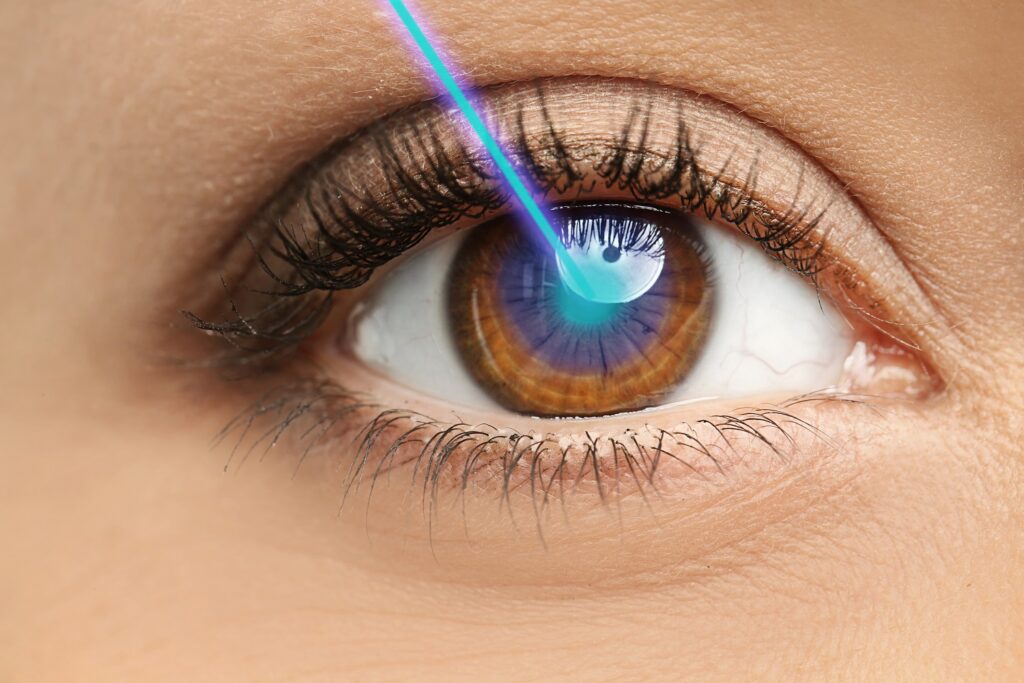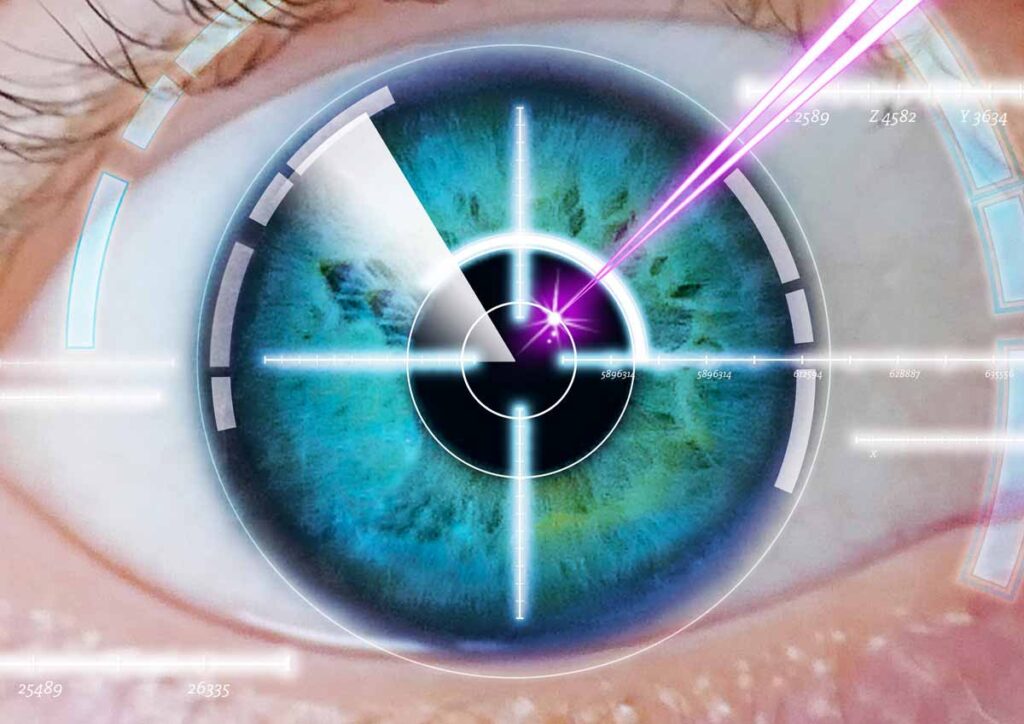Lasik eye surgery has become an increasingly popular choice for individuals seeking vision correction. With its impressive success rates and numerous benefits, it’s no wonder that more and more people are opting for this procedure. In this article, we will explore the basics of Lasik eye surgery, delve into its scientific aspects, discuss the procedure itself, and compare it with other vision correction methods. We will also address common concerns and debunk any myths surrounding Lasik. By the end, you’ll have a better understanding of whether Lasik eye surgery is the right choice for you.
Understanding the Basics of Lasik Eye Surgery
lasik eye, short for “Laser-Assisted In Situ Keratomileusis,” is a refractive surgery procedure that aims to correct vision problems such as nearsightedness, farsightedness, and astigmatism. It involves reshaping the cornea, the clear front surface of the eye, using a laser. By altering the cornea’s shape, the surgery enables light to focus correctly onto the retina, thus improving vision.
Lasik is a safe and effective procedure that has been performed for over two decades. It is an outpatient surgery, meaning you can usually go home the same day. The surgery itself is quick, taking typically around 15 minutes per eye, and the recovery time is relatively short, with most patients experiencing improved vision within a few days.

The Science Behind Lasik Eye Surgery
Lasik eye surgery works by reshaping the cornea to correct vision problems. The cornea acts as the eye’s outermost lens, responsible for focusing light onto the retina. In individuals with refractive errors, the cornea’s shape is either too steep or too flat, causing light to focus incorrectly and resulting in blurry vision.
During Lasik, a thin flap is created on the cornea using either a microkeratome blade or a femtosecond laser. This flap is then folded back, and the underlying cornea tissue is reshaped using an excimer laser. The excimer laser emits a cool, ultraviolet light that removes microscopic amounts of tissue, altering the cornea’s shape. Once the cornea is reshaped, the flap is placed back into position, acting as a natural bandage, promoting faster healing.
By reshaping the cornea, Lasik corrects vision problems by allowing light to focus directly onto the retina, providing clear and sharp vision.
The Procedure: What to Expect During Lasik Surgery
Before undergoing Lasik eye surgery, the first step is to consult with an eye surgeon who will evaluate your eyes and determine if you are a suitable candidate. During the consultation, your surgeon will thoroughly examine your eyes, assess your eye health, and discuss any potential risks or complications.
On the day of the surgery, your eyes will be numbed using anesthetic eye drops, ensuring a comfortable experience. Your surgeon will then use a microkeratome blade or a femtosecond laser to create the corneal flap, followed by reshaping the cornea using the excimer laser. The whole procedure is painless, with most patients experiencing only minimal discomfort or pressure.
After the surgery, your surgeon will provide you with detailed instructions on how to care for your eyes during the recovery period. It is crucial to follow these instructions carefully to promote proper healing and maximize the results of your surgery. While everyone’s recovery experience may vary slightly, most patients can expect to see marked improvement in their vision within the first 24 to 48 hours.
The Benefits of Choosing Lasik Eye Surgery
One of the key reasons why Lasik eye surgery is a popular choice for vision correction is its multitude of benefits. Let’s explore two of the most noteworthy advantages.
Immediate Improvement in Vision
One of the most exciting aspects of Lasik eye surgery is the near-instantaneous improvement in vision that most patients experience. Unlike other vision correction methods that may require an adjustment period, Lasik often provides clear and sharp vision within a few days. This quick turnaround is particularly beneficial for individuals who rely heavily on their vision for work or daily activities.
After Lasik, many patients achieve 20/20 vision or better, allowing them to reduce or eliminate their dependence on corrective eyewear. This newfound freedom from glasses or contact lenses can greatly enhance an individual’s quality of life, boosting confidence and convenience. Read about Essential Tips for Healthy Eyes and Clear Sight at https://optometry.dpu.edu.in/blogs/effective-eye-exercises-rapid-vision-improvement
Minimally Invasive with Quick Recovery Time
Another advantage of Lasik eye surgery is its minimally invasive nature and rapid recovery. As mentioned earlier, the surgery itself is quick, taking only about 15 minutes per eye. The recovery time is relatively short as well, with most patients being able to resume normal activities within a few days.
Unlike more invasive procedures like lens replacement surgery, Lasik preserves the natural lens of the eye. This means that the procedure is reversible and does not require lengthy healing times associated with incisions or wound closures. Many patients experience significant improvements in their vision within the first 24 to 48 hours, with gradual enhancements continuing over the following weeks.
Comparing Lasik Eye Surgery with Other Vision Correction Methods
While Lasik eye surgery has numerous benefits, it is essential to consider how it compares to other vision correction methods. Let’s delve into two common comparisons: Lasik versus glasses and Lasik versus contact lenses.
Lasik vs. Glasses: A Comprehensive Comparison
Glasses have long been a popular choice for vision correction. They offer a non-invasive and easily adjustable solution, allowing individuals to see clearly by wearing the appropriate prescription lenses. However, glasses do come with their fair share of limitations.
One of the main advantages of Lasik over glasses is the freedom it provides. With Lasik, you no longer have to worry about keeping track of glasses, cleaning them, or adjusting them frequently. Additionally, Lasik eliminates the inconvenience of experiencing foggy lenses or dealing with reflections or distortions caused by glasses.
Another significant advantage of Lasik over glasses is the cosmetic aspect. Many individuals dislike the appearance of glasses or feel self-conscious while wearing them. Lasik offers a solution by enabling individuals to achieve clear vision without the need for eyewear.
It’s important to note that while Lasik can correct a wide range of vision problems, including astigmatism, severe cases of nearsightedness or farsightedness may require alternative procedures.
Contact Lenses vs. Lasik: Which is More Beneficial?
Contact lenses are another popular option for vision correction. They provide clear vision by sitting directly on the eye’s surface. While contacts offer numerous advantages, such as enhanced peripheral vision and suitability for certain activities, they also come with their fair share of challenges.
One significant advantage of Lasik over contact lenses is convenience. While contact lenses require proper cleaning, regular replacements, and adherence to strict hygiene measures to prevent infections, Lasik eliminates these concerns. Once the surgery is performed successfully, you no longer have to worry about inserting or removing contacts or carrying around lens solution and spare lenses.
Furthermore, Lasik eye surgery provides consistent vision correction throughout the day. Contacts may sometimes cause discomfort or dryness, especially when worn for an extended period. With Lasik, the need for constantly adjusting or moisturizing the lenses is eliminated, providing a more comfortable and hassle-free experience.
Although Lasik may require an initial investment, it can become a more cost-effective long-term solution compared to purchasing new contact lenses or refilling lens solution regularly. To learn more about the Pros and Cons of contacts and lasik click here.
Addressing Common Concerns About Lasik Eye Surgery
Despite its proven success and popularity, Lasik eye surgery can still raise concerns amongst individuals considering the procedure. Let’s address some of the most common worries and debunk any misunderstandings.
Debunking Myths About Lasik Eye Surgery
One of the most common myths surrounding Lasik is the idea that it is a painful or risky procedure. In reality, Lasik is a safe and virtually pain-free surgery. Before the procedure, your eyes are numbed using anesthetic eye drops, ensuring your comfort throughout the process. While it’s natural to experience some mild discomfort or temporary dryness after the surgery, these symptoms are typically short-lived.
Another myth surrounding Lasik is the belief that it can result in permanent vision loss or worsened eyesight. In fact, the vast majority of Lasik patients achieve significantly improved vision with minimal side effects. While there are always potential risks associated with any surgical procedure, serious complications with Lasik are rare.
Addressing Safety and Potential Risks of Lasik
As with any surgical procedure, safety is a valid concern. It’s important to choose an experienced and reputable eye surgeon who specializes in Lasik. By opting for a qualified professional, you significantly reduce the risk of complications or adverse outcomes.
During the consultation process, your eye surgeon will thoroughly assess your eyes and overall health to determine if you are a suitable candidate for Lasik. Factors such as corneal thickness, eye dryness, or a history of certain eye conditions may affect your eligibility for the surgery. Your surgeon will discuss these considerations with you and present alternative options if necessary.
While Lasik is generally safe and effective, it’s crucial to have realistic expectations. Your eye surgeon will explain the potential outcomes and limitations of the procedure, allowing you to make an informed decision. By understanding the risks involved and adhering to the post-operative care instructions, you can minimize complications and enjoy the full benefits of Lasik eye surgery.
Making the Decision: Is Lasik Eye Surgery Right for You?
Deciding whether to undergo Lasik eye surgery is a personal choice that should be based on thorough research, consultation with a qualified eye surgeon, and careful consideration of your unique circumstances. Here are some essential factors to consider before opting for Lasik:
Factors to Consider Before Opting for Lasik
Stability of your prescription:
It is generally recommended to have a stable prescription for at least one year before undergoing Lasik.
Age:
Lasik is most suitable for individuals over the age of 18, as their eyes have typically fully matured by that point.
Overall eye health:
You should have a healthy cornea, absence of eye diseases, and adequate corneal thickness for the procedure.
Occupation and lifestyle:
Consider how your career or hobbies may be affected by glasses or contact lenses and weigh the benefits of clear vision without eyewear.
Cost:
Understand the financial aspect of the surgery, including the initial investment and potential long-term savings from reduced reliance on corrective eyewear.

Preparing for a Consultation with Your Eye Surgeon
Gather relevant information:
Collect your eye health history, previous prescriptions, and a list of any questions or concerns you may have.
Research potential eye surgeons:
Look for experienced professionals with a track record of successful Lasik procedures. Read reviews, and ask for recommendations from friends or family.
Attend the consultation:
Be prepared to discuss your eye health, lifestyle, and expectations. It is crucial to be open and honest during the consultation to receive accurate information and personalized guidance.
Ask questions:
Don’t hesitate to inquire about the surgeon’s experience, success rates, and any potential risks or side effects of the surgery. Remember, knowledge is power, and the more informed you are, the better equipped you’ll be to make an educated decision.
By carefully considering these factors and preparing for your consultation, you are taking crucial steps toward making an informed decision about Lasik eye surgery. Remember, every individual is unique, and what might be suitable for one person may not be the best option for another.
Conclusion
Lasikeye surgery has gained popularity as a highly effective vision correction method. By understanding the basics of the procedure, exploring its scientific aspects, and comparing it to other vision correction methods, you have more knowledge to decide if it’s the right choice for you. We’ve addressed common concerns, debunked myths, and provided guidance on factors to consider before making a decision. Remember, making the choice to undergo Lasik eye surgery is a personal decision. Consult with an experienced eye surgeon, ask questions, and take the time to weigh the benefits and potential risks. With the right information and guidance, you can make an educated choice that may lead to clear and improved vision.
Read more on: The Advantages of Lasik Eye Surgery for Vision Correction

